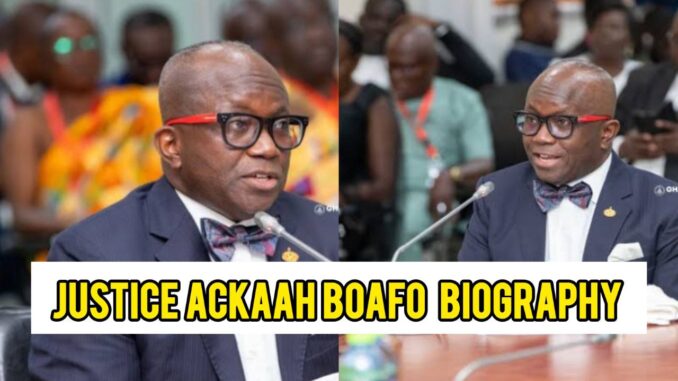
Justice Ackaah Boafo Biography
Justice Kwaku Tawiah Ackaah-Boafo was born on October 15, 1967, in Kumasi, Ghana. He is a seasoned Ghanaian jurist recently nominated for the Supreme Court. His parliamentary vetting underscored a nuanced approach to legal reform—calling for improved legal education, trust in institutions, clear judicial accountability, and technological advancement—while defending the integrity of the judiciary. Justice Ackaah Boafo is 58 years old as of 2025.
His parents, both teachers, nurtured his curiosity from an early age. In local primary and secondary schools, Ackaah-Boafo excelled in debates and student leadership. He earned his Bachelor of Laws at the University of Ghana, where he graduated with honours, demonstrating both sharp intellect and strong moral sense. Continuing his legal training, he attended the Ghana School of Law and was called to the bar, ready to serve the public. Outside the lecture halls, he volunteered at free-legal clinics, offering guidance to families who could not afford counsel.
Justice Ackaah Boafo Career
After being called to the bar, Kwaku Ackaah-Boafo joined the Attorney-General’s Department as a State Attorney, where he prosecuted criminal cases and advised government ministries on legal matters. His clear reasoning and calm courtroom manner earned him praise from colleagues and judges alike. Within a few years, he was elevated to Senior State Attorney and then to Director of Public Prosecutions. In that role, he supervised complex criminal investigations, ensuring that evidence was handled meticulously and that accused persons received fair trials.
Recognized for his unwavering commitment to justice, President Nana Akufo-Addo appointed him to the Court of Appeal in 2014. Over the next decade, he wrote landmark judgments on constitutional rights, property disputes, and election petitions. His opinions were noted for their clarity, respect for precedent, and thoughtful consideration of social context. Beyond the courtroom, he mentored young lawyers, teaching at the Ghana School of Law and guest lecturing at universities. Colleagues describe him as a jurist who combines rigorous legal analysis with empathy, traits that prepared him for the highest level of service.
Justice Ackaah Boafo Appointment
In June 2025, President John Dramani Mahama nominated Justice Ackaah-Boafo among seven Court of Appeal judges to join Ghana’s Supreme Court, the country’s final appellate and constitutional tribunal. His parliamentary vetting on July 20 became a focal point for discussions on judicial accountability and legal reform. During questioning, he suggested that the vague phrase “stated misbehavior” in Article 146 of the 1992 Constitution should be defined through clear regulations or a constitutional instrument.
He argued that such specificity would guide both judges and citizens, ensuring that grounds for removal from office were transparent and fair. His proposal won nods from lawmakers who share concerns over judicial conduct. The vetting committee, chaired by Bernard Ahiafor, also addressed a petition accusing him of insulting a litigant in a 2019 DVLA case. After reviewing the evidence, the committee dismissed the petition as unfounded and outside its constitutional mandate to try judicial officers for actions taken in open court. With that hurdle cleared, his confirmation moved forward, reflecting broad support for his intellect, restraint, and vision for a more accountable judiciary.
Justice Ackaah Boafo Controversies
Though widely respected, Justice Ackaah-Boafo’s career has not been without contention. The most prominent dispute arose during his Supreme Court nomination, when activist Anthony Kwabenya Rau lodged a petition alleging the judge called him “arrogant” and “power drunk” in court. Critics argued the claim threatened public confidence in the bench, while supporters saw the petition as a tactic to delay his appointment.
The Appointments Committee rejected the petition, citing Article 127(3), which protects judges from suits over their judicial acts. Ackaah-Boafo himself maintained that judicial proceedings sometimes require firm language to maintain courtroom decorum, but that respect for all parties is paramount. Beyond this incident, some civil society groups have pressed for swifter reforms in judicial discipline, backed by his own call for clearer rules on misconduct. Ackaah-Boafo’s stance—that “stated misbehavior” must be defined by regulation—has drawn both praise for forward thinking and critique from traditionalists who fear overregulation could impinge on judicial independence.
Conclusion
Justice Kwaku Tawiah Ackaah-Boafo’s life and career reflect a steady ascent rooted in scholarship, service, and principled leadership. From his Kumasi childhood to his role as senior jurist on the Court of Appeal, he has championed fairness, legal clarity, and judicial integrity. His proposal to define “stated misbehavior” signals a desire to strengthen public trust without undermining the independence of the bench. As he stands on the threshold of Ghana’s Supreme Court, his journey offers a model of how legal expertise, mentorship, and measured reform can shape a more robust justice system.
FAQs
What is Justice Ackaah-Boafo’s educational background?
He earned his LLB with honours from the University of Ghana and completed professional training at the Ghana School of Law before practicing as a State Attorney.
What notable roles did he hold before his nomination?
He served as Director of Public Prosecutions, was appointed to the Court of Appeal in 2014, and wrote influential judgments on constitutional and criminal matters.
Why did he suggest defining “stated misbehavior” in the Constitution?
He believes clear regulations or a constitutional instrument would set transparent grounds for removing judges, enhancing accountability and public confidence.
What was the petition filed against him during vetting?
Activist Anthony Rau claimed the judge insulted him in a 2019 court case. The Appointments Committee dismissed the petition as baseless and outside its constitutional purview.
How does he balance reform and judicial independence?
By advocating precise definitions for misconduct without prescribing disciplinary procedures, he aims to improve accountability while respecting the separation of powers.

West is both an engineer and a construction manager with a solid ten-year track record in directing building projects and managing their financial aspects. Throughout his career, he has honed his skills in coordinating multidisciplinary teams, streamlining budget processes, and structuring financing plans that ensure projects are delivered on time and within financial targets.
Leave a Reply